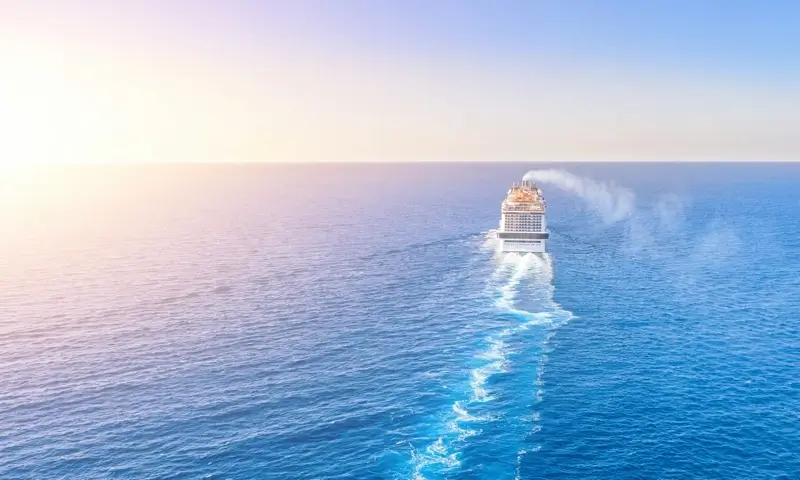Measuring Progress in Cruise Ship Environmental Technology
The cruise industry has taken notable strides in environmental responsibility over the years. The Cruise Lines International Association (CLIA) recently released its Environmental Technologies and Practices (ETP) report, revealing measurable improvements in key areas such as energy efficiency, fuel alternatives, and emissions reduction through data spanning from 2018 to 2024.
Industry-Wide Commitment to Greener Operations
CLIA represents cruise lines accounting for over 90% of the global cruise market, making its reports a valuable indicator of industry trends. The current report highlights a shift toward sustainable innovation, with cruise companies increasingly testing biofuels, adopting fuel-flexible engines, and prioritizing energy-saving initiatives. These efforts are significant steps toward reducing the environmental footprint of the nearly floating cities that cruise ships often resemble.
Technological Innovations on the Horizon
Modern cruise ships now integrate advanced wastewater treatment systems, shore power connections to cut engine emissions in ports, and hull air lubrication to improve fuel economy. One particularly exciting advancement is the rise of dual-fuel engines, which enable vessels to operate on cleaner fuels. As of the report, more than 80 new cruise ships featuring these technologies are under construction worldwide, representing a long-term investment in environmental performance.
CLIA Leadership on Sustainable Maritime Practices
Bud Darr, the president and CEO of CLIA, underscores the cruise industry’s role as early adopters of maritime environmental technology. In his view, innovations developed for cruise ships often benefit the wider maritime sector. These investments amount to tens of billions of dollars, supporting an ongoing transformation of the global cruise fleet toward greener operations.
Environmental Efforts in Context: Challenges and Industry Impact
Despite the advances, the cruise industry still faces challenges. Cruise ships are akin to small towns, generating millions of liters of wastewater over typical voyages. Managing this waste responsibly is a complex task—while regulations permit the discharge of greywater and some blackwater at sea, increasing efforts to treat and reduce pollution remain crucial.
Environmental Management Systems and Programs
Leading cruise lines have implemented policies to oversee environmental measures onboard. This includes appointing dedicated environmental officers responsible for crew training and waste management, alongside “Save Our Seas” initiatives promoting recycling efforts among passengers and staff. Such programs improve onboard environmental stewardship but also respond to growing passenger awareness and expectations around sustainability.
Impact on Ports and Destinations
Ports that welcome cruise ships benefit economically, but there are environmental trade-offs. Running ship engines while docked contributes to air pollution; however, new policies encourage the use of shorepower to mitigate this impact. On land, destinations must manage the influx of visitors responsibly—balancing economic benefits with community and environmental well-being remains an ongoing concern.
What This Means for Travelers and Transfers
When planning their trips, travelers increasingly value sustainable travel options. Booking a transfer or taxi service that aligns with eco-conscious values can complement a cruise itinerary. Platforms like GetTransfer.com allow users to select vehicles that meet specific criteria—offering transparency on car make, model, driver ratings, and more. This empowers travelers to make informed choices from airport rides to city transfers, aligning their ground transportation with the environmentally aware mindset championed by modern cruise lines.
Summary of Key Environmental Technologies and Practices
| Technology/Practice | Περιγραφή | Όφελος |
|---|---|---|
| Biofuel Testing | Trial and use of sustainable fuels derived from biological sources. | Lower emissions and reduced carbon footprint. |
| Fuel-Flexible Engines | Engines capable of running on multiple fuel types, including cleaner options. | Operational flexibility with environmental efficiency. |
| Advanced Wastewater Systems | Onboard treatment facilities that handle greywater and blackwater responsibly. | Minimized pollution of marine ecosystems. |
| Onshore Power Supply | Connecting ships to electrical grids when docked to reduce engine emissions. | Improved air quality in port areas. |
| Air Lubrication Systems | Reducing hull friction by introducing a layer of air bubbles. | Enhanced fuel efficiency and reduced emissions. |
The Value of Personal Experience and Smart Transfer Choices
While industry reports and reviews shed light on environmental progress, nothing beats firsthand experience when judging service quality. GetTransfer.com connects users with verified drivers and providers offering a wide range of vehicles at reasonable prices. This ensures travelers can enjoy transparent, convenient, and affordable transfers—whether heading to the airport or exploring a new destination.
The platform’s extensive vehicle selection and detailed service information support making the best choice for each trip, avoiding surprises related to fare or service. Combining quality ground transportation with the cruise industry’s sustainable advances makes for a travel experience that is enjoyable and responsible.
Κάντε κράτηση για τη βόλτα σας στο GetTransfer.com and experience seamless transfers tailored to your needs.
Looking Ahead: Sustainability’s Place in Travel and Tourism
The cruise industry’s steady environmental improvements represent important moves for global tourism, though their impact varies by region. As cruise lines continue to adopt green technologies and practices, travelers and transfer services alike can benefit from a broader shift toward sustainability. GetTransfer strives to keep pace with these evolving trends, ensuring user access to the most up-to-date and transparent transfer options worldwide.
Start planning your next adventure and secure your worldwide transfer with GetTransfer for an eco-friendly, reliable journey from the plane to your destination.
Συμπέρασμα
From boosting operational efficiency to investing in alternative fuels, the cruise industry shows tangible progress in reducing its environmental footprint. Technologies like dual-fuel engines and advanced wastewater management pinpoint the current focus areas. Although challenges remain, the ongoing commitment to sustainability signals a better, cleaner travel future.
With platforms like GetTransfer.com, travelers can complement greener sea voyages by booking private taxi or transfer services that offer detailed vehicle and driver profiles, transparent pricing, and a vast selection of options worldwide. This alignment of sea and land travel supports the evolving expectations for sustainable and convenient journeys in today’s tourism landscape.
Choosing the best transfer service at the right time, place, and price ensures the journey is as responsible and comfortable as the destination itself.


Σχόλια